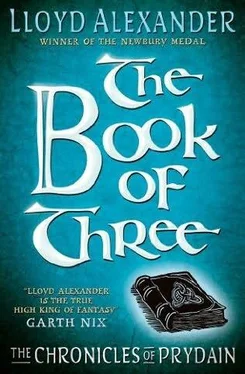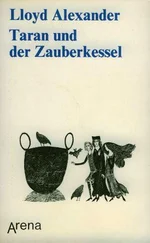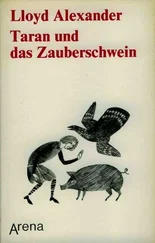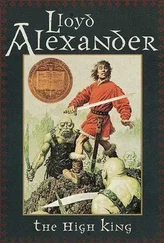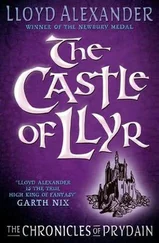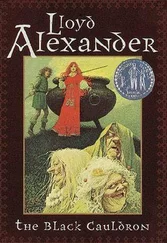Lloyd Alexander - The Book of Three
Здесь есть возможность читать онлайн «Lloyd Alexander - The Book of Three» весь текст электронной книги совершенно бесплатно (целиком полную версию без сокращений). В некоторых случаях можно слушать аудио, скачать через торрент в формате fb2 и присутствует краткое содержание. Жанр: Фэнтези, на английском языке. Описание произведения, (предисловие) а так же отзывы посетителей доступны на портале библиотеки ЛибКат.
- Название:The Book of Three
- Автор:
- Жанр:
- Год:неизвестен
- ISBN:нет данных
- Рейтинг книги:4 / 5. Голосов: 1
-
Избранное:Добавить в избранное
- Отзывы:
-
Ваша оценка:
- 80
- 1
- 2
- 3
- 4
- 5
The Book of Three: краткое содержание, описание и аннотация
Предлагаем к чтению аннотацию, описание, краткое содержание или предисловие (зависит от того, что написал сам автор книги «The Book of Three»). Если вы не нашли необходимую информацию о книге — напишите в комментариях, мы постараемся отыскать её.
The Book of Three — читать онлайн бесплатно полную книгу (весь текст) целиком
Ниже представлен текст книги, разбитый по страницам. Система сохранения места последней прочитанной страницы, позволяет с удобством читать онлайн бесплатно книгу «The Book of Three», без необходимости каждый раз заново искать на чём Вы остановились. Поставьте закладку, и сможете в любой момент перейти на страницу, на которой закончили чтение.
Интервал:
Закладка:
"I would ask you inside," Medwyn continued, "but the disorder at the moment― there were bears at breakfast, and you can imagine the state of things. So I must ask you to attend to yourselves. If you would rest, there is straw in the byre; it should not be too uncomfortable for you."
The travelers lost no time helping themselves to Medwyn's provisions, or in finding the byre. The sweet scent of hay filled the low-ceilinged building. They scooped out nests in the straw, uncovering one of Medwyn's breakfast guests curled up and fast asleep. Fflewddur, at first uneasy, was finally convinced the bear had no appetite for bards, and soon began snoring. Eilonwy dropped off to sleep in the middle of one of her sentences.
Taran had no desire to rest. Medwyn's valley had refreshed him more than a night's slumber. He left the byre and strolled across the meadow. At the far side of the lake, otters had built a slide and were amusing themselves by tumbling down it. At Taran's approach, they stopped for a moment, raised their heads to look at him as though sorry he was unable to join them, and returned to their game. A fish broke water in a twinkle of silver scales; the ripples widened until the last of them lapped gently at the shore.
Medwyn, Taran saw, had gardens of both flowers and vegetables behind the cottage. To his surprise, Taran found himself yearning to work with Coll in his own vegetable plot. The weeding and hoeing he had so despised at Caer Dallben now seemed, as he thought of his past journey and the journey yet to come, infinitely pleasant.
He sat down by the rim of the lake and looked across to the hills. With the sun resting above the peaks, the wooden skeleton of the great ship stood out sharply against the mound which nearly enveloped it. He had little chance to study it, for Medwyn appeared, walking deliberately across the field; the fawn trotted beside him, the three wolves followed. With his brown robe and white hair, Medwyn looked as broad and solid as a snow-capped mountain.
"Gurgi is more comfortable than he was," the ancient man said in his deep voice. The fawn danced at the lake shore while Medwyn ponderously sat down and leaned his huge head toward Taran. "He will recover well; there is no longer any danger. Not, at least, while he is here."
"I have thought long of Gurgi," Taran said, looking frankly into the old man's gray eyes. He explained, then, the reason for his journey and the events leading to Gurgi's accident. Medwyn listened carefully, head cocked to one side, thoughtful, while Taran recounted Gurgi's willingness to sacrifice his own life rather than endanger the others. "At first, I wasn't too fond of him," Taran admitted. "Now I've begun to like him in spite of all his whining and complaining."
"Every living thing deserves our respect," said Medwyn, knitting his shaggy brows, "be it humble or proud, ugly or beautiful."
"I wouldn't want to say that about the gwythaints," Taran answered.
"I feel only sorrow for those unhappy creatures,'' Medwyn said. "Once, long ago, they were as free as other birds, gentle and trusting. In his cunning, Arawn lured them to him and brought them under his power. He built the iron cages which are now their prison house in Annuvin. The tortures he inflicted on the gwythaints were shameful and unspeakable. Now they serve him out of terror.
"Thus would he strive to corrupt every animal in Prydain, no less than the race of men. That is one of the reasons I remain in this valley. Here, Arawn cannot harm them. Even so, were he to become ruler of this land, I doubt I could help them all. Those who fell into his clutches would be counted fortunate if they perished quickly."
Taran nodded. "I understand more and more why I must warn the Sons of Don. As for Gurgi, I wonder if it wouldn't be safer for him to stay here."
"Safer?" asked Medwyn. "Yes, certainly. But you would hurt him grievously were you to turn him away now. Gurgi's misfortune is that he is neither one thing nor the other, at the moment. He has lost the wisdom of animals and has not gained the learning of men. Therefore, both shun him. Were he to do something purposeful, it would mean much to him.
"I doubt he will delay your journey, for he will be able to walk as well as you― by tomorrow, easily. I urge you to take him. He may even find his own way of serving you. Neither refuse to give help when it is needed," Medwyn continued, "nor refuse to accept it when it is offered. Gwythyr Son of Greidawl learned that from a lame ant, you know."
"A lame ant?" Taran shook his head. "Dallben has taught me much about ants, but nothing of a lame one."
"It is a long history," Medwyn said, "and perhaps you will hear all of it another time. For the moment, you need only know that when Kilhuch― or was it his father? No, it was young Kilhuch. Very well. When young Kilhuch sought the hand of the fair Olwen, he was given a number of tasks by her father, Yspadadden; he was Chief Giant at the time. What the tasks were does not concern us now, except that they were very nigh impossible, and Kilhuch could not have accomplished them without the aid of his companions.
"One of the tasks was to gather nine bushels of flax seed, though there was scarcely that much in all the land. For the sake of his friend, Gwythyr Son of Greidawl undertook to do this. While he was walking over the hills, wondering how he might accomplish it, he heard a grievous wailing from an anthill; a fire had started around it and the ants were in danger of their lives. Gwythyr― yes, I'm quite sure it was Gwythyr― drew his sword and beat out the fire.
"In gratitude, the ants combed every field until they had collected the nine bushels. Yet the Chief Giant, a picky and disagreeable sort, claimed the measure was not complete. One flax seed was missing, and must be delivered before nightfall.
"Gwythyr had no idea where he could find another flax seed, but at last, just as the sun had begun to set, up hobbled a lame ant carrying a heavy burden. It was the single flax seed, and so the last measure was filled.
"I have studied the race of men," Medwyn continued. "I have seen that alone you stand as weak reeds by a lake. You must learn to help yourselves, that is true; but you must also learn to help one another. Are you not, all of you, lame ants?"
Taran was silent. Medwyn put his hand into the lake and stirred the water. After a moment, a venerable salmon rippled up; Medwyn stroked the jaws of the huge fish.
"What place is this?" Taran finally asked, in a hushed voice. "Are you indeed Medwyn? You speak of the race of men as if you were not one of them."
"This is a place of peace," Medwyn said, "and therefore not suitable for men, at least, not yet. Until it is, I hold this valley for creatures of the forests and the waters. In their mortal danger they come to me, if they have the strength to do so― and in their pain and grief. Do you not believe that animals know grief and fear and pain? The world of men is not an easy one for them."
"Dallben," said Taran, "taught me that when the black waters flooded Prydain, ages ago, Nevvid Nav Neivion built a ship and carried with him two of every living creature. The waters drained away, the ship came to rest― no man knows where. But the animals who came safe again into the world remembered, and their young have never forgotten. And here," Taran said, pointing toward the hillside, "I see a ship, far from water. Gwydion called you Medwyn, but I ask…"
"I am Medwyn," answered the white-bearded man, "for all that my name may concern you. That is not important now. My own concern is for Hen Wen."
"You have seen nothing of her, then?"
Medwyn shook his head. "What Lord Gwydion said is true: of all places in Prydain, she would have come here first, especially if she sensed her life in danger. But there has been no sign, no rumor. Yet she would find her way, sooner or later, unless…"
Читать дальшеИнтервал:
Закладка:
Похожие книги на «The Book of Three»
Представляем Вашему вниманию похожие книги на «The Book of Three» списком для выбора. Мы отобрали схожую по названию и смыслу литературу в надежде предоставить читателям больше вариантов отыскать новые, интересные, ещё непрочитанные произведения.
Обсуждение, отзывы о книге «The Book of Three» и просто собственные мнения читателей. Оставьте ваши комментарии, напишите, что Вы думаете о произведении, его смысле или главных героях. Укажите что конкретно понравилось, а что нет, и почему Вы так считаете.
